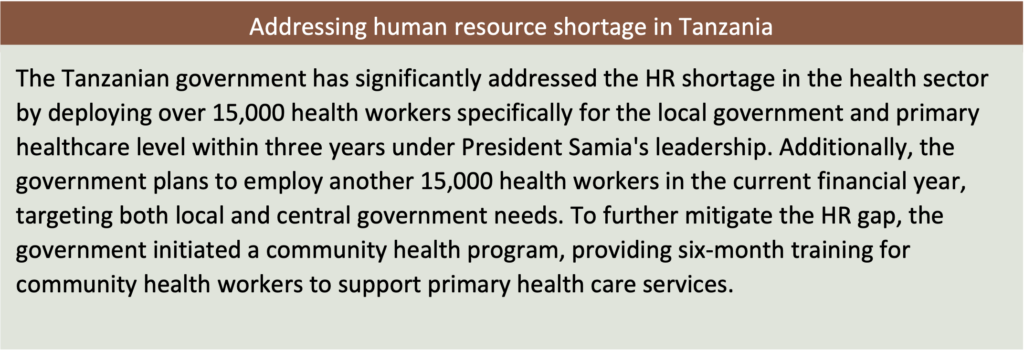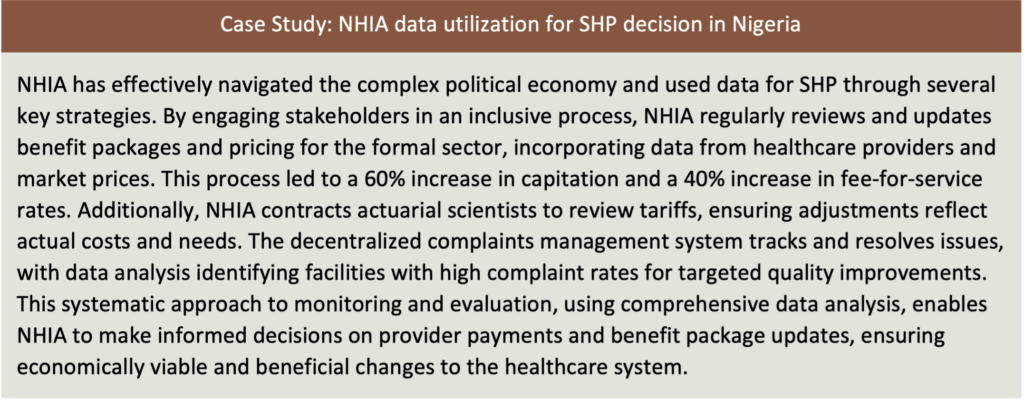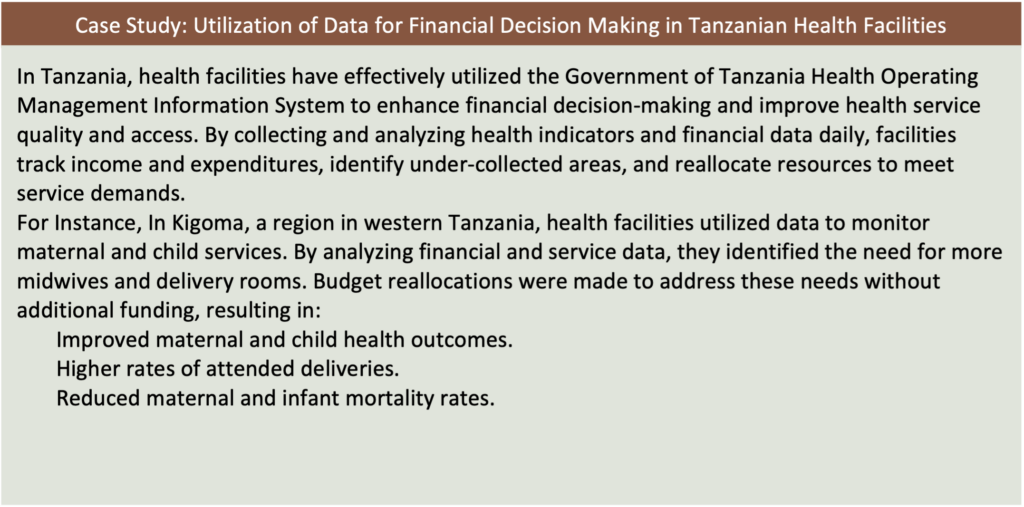Webinar series
1. Introduction
This webinar held on 24th July 2024, is the second in a two-part series focusing on the utilization of data for decision-making in strategic health purchasing (SHP) and health financing. The session aimed to address factors influencing data utilization and to engage participants in sharing their experiences and challenges.
In Tanzania, Direct Health Facility Financing (DHFF) system in Tanzania was introduced in 2017 to implement fiscal decentralization and strengthen autonomy in resource management at the health facility level. The DHFF system has led to improvements in data management and utilization, ensuring effective use of funds and enhancing service delivery. However, challenges such as limited data literacy and analytical skills among health facility staff persist.
Nigeria’s complex three-tier health system includes federal, state, and local government levels. The health financing system in Nigeria is mixed, with government funding, out-of-pocket expenditure, health insurance, donor funding, and vertical programs. The National Health Insurance Act of 2022 and other reforms have improved resource mobilization and health insurance coverage. Despite the complexity, there are opportunities for data-driven decision-making and digitization in the health sector.
Challenges with Health Management and Information Management Systems in Tanzania
Health Worker Capacity
- Sub-optimal understanding of basic data concepts such as data quality, data management, and statistical analysis. This hinders their ability to effectively collect, interpret, and use data for decision-making.
- Sub-optimal capacity in using data management tools like DHIS2 and PlanRep, leading to incomplete and inaccurate data entry and analysis.
- Inconsistency in data reporting, which affects the reliability and practicality of data across different facilities.
- Sub-optimal use of data used by health workers to inform their decisions, limiting the potential impact of data-driven improvements in health services.
Systemic Challenges that further hinder the capacity building of health workers
- Human Resource Shortages: The primary healthcare level faces a 52% shortfall in human resources. Overburdened staff often prioritize clinical duties over data management, affecting their ability to effectively use data for decision-making.
- Insufficient Funding: Limited financial resources restrict investment in essential training and technology. Inadequate funding for infrastructure development hampers the ability to provide necessary facilities and equipment. Lack of financial incentives and motivation for health workers leads to decreased engagement in data-related tasks.
- Infrastructure Deficiencies: Many health facilities, particularly in remote areas, lack basic infrastructure such as electricity, internet connectivity, and computers. Although there is an ongoing electrification project, many facilities still face challenges in accessing reliable power and technological resources.
- Data Quality Issues: The healthcare system struggles with fragmented data systems that are not interoperable, leading to difficulties in data integration and analysis. There is a lack of standardized data collection methods, resulting in inconsistent and unreliable data.
Strategies to Address the Challenges
Training and Education Programs – The government, in collaboration with various health organizations, has implemented training programs, workshops, and seminars focused on data management, analysis, and use. This includes training on health information systems like DHIS2 and PlanRep. Additionally, Health training institutions have integrated data literacy into their curriculums, offering programs like health informatics in medical and nursing schools. Additionally, experienced data managers and supervisors provide on-the-job support and guidance to health workers in data collection, entry, and analysis.
Strengthening Data Reporting Standards – Establishing standardized data reporting protocols and guidelines across all health facilities. The Ministry of Health provides clear guidance on data reporting requirements and conducts regular audits to ensure compliance.
Supportive Supervision and Feedback – Conducting supportive supervision and providing feedback to reinforce good data practices and address gaps.

Collaboration with International Partners – Collaborating with international organizations to provide technical assistance, funding, and resources for data literacy initiatives. Programs supported by WHO and UNICEF enhance data capacity in the health sector.
Financial and ICT Reforms – The government undertakes financial reforms and enhances the implementation of ICT improvements and interoperability of operating systems like PlanRep and Epicor.
Challenges with Health Management and Financial Information Management Systems in Nigeria
Multiple Fragmented Systems: The databases within various organizations and ecosystems are often fragmented and not interoperable. Different departments and programs within an organization may have databases that do not communicate with each other.
No Standardized tools: There is a lack of standardized tools and templates for data collection and reporting. This variation, with some systems still being paper-based and others digital, hampers the harmonization of data sets and complicates the process of integrating data from different sources.
Sub-optimal capacity at different levels of the health system: These include the ability to identify necessary data, accurately collect and record it, analyze it, transmit it electronically, and use it for decision-making. Furthermore, health workers often lack feedback on how the data they collect impacts decisions, reducing their understanding and motivation.
Strategies to Address the Challenges
- Integration of Databases – Efforts to integrate multiple fragmented databases virtually are crucial. This includes finding ways to standardize and harmonize tools and data sets used across different programs and states. For instance, the integration initiatives around the Basic Healthcare Provision Fund (BHCPF) have been significant.
- Standardizing Data Collection Tools – Development and implementation of standardized templates and protocols for data collection. The BHCPF provides a good example where the implementation protocol includes a section on monitoring and evaluation, detailing the data reporting flow and roles of different stakeholders.
- Building Technical Capacity – Continuous training and supportive supervision are essential due to high turnover rates and ongoing changes in the health sector. This ensures that new developments are incorporated, and skills are continually reinforced.
- Job Aids and Role Clarity – Providing job aids and clear guidelines to health workers and program managers helps them understand what data is needed and how to use it. The BHCPF implementation includes job aids and hands-on training involving both decision-makers and data collectors to ensure a holistic understanding and capability.
Role of Development Partners in addressing HRH shortages in data management
Development partners play a crucial role in addressing health worker shortages by providing both short-term and long-term support. They can assist governments in providing additional financing for the health sector and improving deployment of healthcare workers effectively using data. This support helps optimize resource allocation and monitor healthcare worker performance. Additionally, development partners can promote the use of technology to augment human resources and implement task-shifting strategies to maximize the efficiency of healthcare services. Organizations like AMREF have significantly contributed to health workforce development through training programs and digital platforms, ensuring continuous capacity building for health workers, especially at the primary healthcare level.
Enhancing Data Integration in Private Health Facilities
In Tanzania, the government promotes Public–Private Partnership (PPPs) and ensures private facilities submit data regularly. Capacity-building visits are conducted to support private facilities. Efforts are made to train both public and private health staff in data generation and management. However, funding limitations restrict comprehensive support for private facilities. A standardized data collection tool is used across both public and private facilities, and data is monitored by the government.


In Nigeria, Private providers are included in the insurance system and regulated to ensure data collection. However, public facilities receive more government funding, affecting resource allocation. While private facilities are regulated and data is ideally collected by the Ministry of Health, there is a discrepancy in funding and resources between public and private facilities, affecting data management and infrastructure. There is a need for better automation to facilitate data collection and integration. Feedback from data collected is crucial for decision-making.
Conclusion
The webinar underscores that the challenges of data utilization in health systems are quite uniform across participating countries, with major issues including fragmentation and poor interoperability of data systems. Capacity constraints at both the facility and systemic levels, coupled with infrastructure and human resource challenges, further complicate efforts. Governments must prioritize increasing the skilled health workforce, health worker capacity and improving critical infrastructure to improve utilization of data for decision making and thereby increase quality, access and equity in the provision of health services.
To view the recording of the webinar, visit the SPARC YouTube page.
To learn more about SPARC and its curated resources, please visit our website: SPARC Africa.
Summarized by Moreen Mwenda and Ebubechi Nwaononiwu

